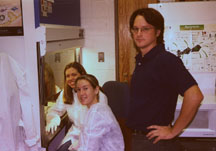Robert A. Kurt
 Professor
Professor
Immunobiology
(kurtr@lafayette.edu) e-mail
(610) 330-5681 voice
(610) 330-5705 FAX
Immunological research is the focus of my laboratory. Currently, there are two major areas of interest: analyzing the early immune response to cancer and modeling the immune response to cancer.
Area #1.
The first area of interest in my laboratory is tumor-induced immune suppression. It is well known that tumors produce factors capable of suppressing our immune system such as vascular endothelial growth factor (VEGF) and transforming growth factor-β (TGF-β). Impairments in the ability of T cells to signal through the T cell receptor have also been identified as a mechanism of immune suppression in tumor-bearing hosts. Currently, my laboratory is interested in studying how tumor-derived chemokines adversely influence anti-tumor immunity and tumor metastasis. The long-term goal of this project is to identify ways in which tumors have found to bypass our bodies defense against them.
Recent publications:
- A dual role for tumor-derived RANTES (CCL5). E.P. Adler (’02), C. Lemken (’06), N. Katchen (’04), R. Kurt. Immunology Letters 90: 187-194, 2003.
- Altered chemokine receptor sensitivity in FVBN202 rat neu transgenic mice. M. Bauck (’02), S. Harma (’02), P. Vitiello (’02), E. Adler (’02), A. Baher, K. Wisner, S. Tackitt, W. Urba, R. Kurt. Breast Cancer Research and Treatment 77: 225-232, 2003.
- Chemokines and anti-tumor immunity: walking the tightrope. M. Brault (’03) and R. Kurt. International Reviews Immunology 22: 199-228, 2003.
- Impact of tumor-derived CCL2 on T cell effector function. P. Vitiello (’02), M. Shainheit (’03), E. Allison (’03), E. Adler (’02), R. Kurt. Immunology Letters 91: 239-245, 2004.
- Inhibition of metastasis by down-regulation of tumor-derived CCL5. KA.Stormes (’04), C. Lemken (’06), J. Lepre (’05), M. Marinucci (’05), R. Kurt. Breast Cancer Research and Treatment 89: 209-212, 2005.
Area #2.
The second area of interest in my laboratory has focused on deciphering ways in which chemokines influence T cells in vitro. For this purpose we have identified a chemokine capable of recruiting antigen-specific T cells, and have begun to decipher how constitutive chemokine exposure can impair T cells. Currently, most of the effort on this project has centered around using confocal microscopy to analyze the molecular interactions between the T cell receptor and chemokine receptors.
Recent publications:
- Role of C chemokine lymphotactin in mediating recruitment of antigen-specific CD62Llo cells in vitro and in vivo. R. Kurt, M. Bauck (’02), S. Harma (’02), K. McCulloch, A. Baher, W. Urba. Cellular Immunology 209: 83-88, 2001.
- Secondary lymphoid tissue chemokine-induced modulation of T cells. P. Vitiello (’02), M. Rausch (’03), K. Horowitz (’04), R. Kurt. Immunological Investigations 33: 235-249, 2004.
- Functional and Molecular Alterations in T Cells Induced by CCL5. T.J. Cridge (06), K.M. Horowitz (04), M.N. Marinucci (05), K.M. Rose (06), M. Wells (05), M.T. Werner (07), R.A. Kurt. Immunological Investigations, 35: 115-132, 2006.
There are also several research collaborations with other Professors at Lafayette. Results from two collaborations (one with Prof Gorman in Mathematics and one with Prof Fried in Biology) have been published.
Recent publications:
- Evidence of peripheral T cell abnormalities in Schistosoma mansoni infected mice. R. Kurt, M. Brault (’03), B. Fried. Journal of Parasitology 89: 721-725, 2003.
- Mathematical modeling the effector cell response to cancer. A. Colton (’03), E. Allison (’03), M. Shainheit (’03), A. Gorman, R. Kurt. Mathematical and Computer Modeling 39: 1313-1327, 2004.
- An Experimental and Theoretical Study of Lymphocyte Cytotoxicity Against Tumor Cells. A.D. Gorman, R.A. Kurt. J. Penn. Acad. Sci., 78: 71-75, 2004.